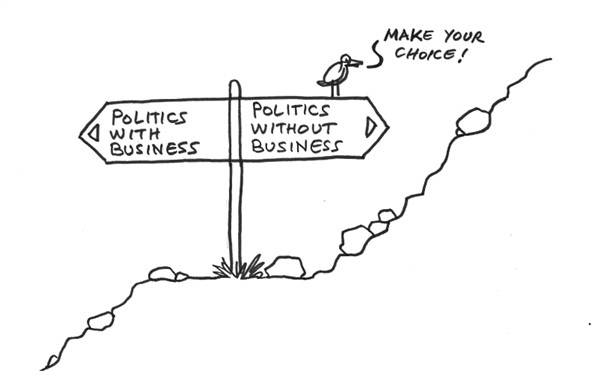
Crisis
Sir,
The Father of Nation waged a political struggle to create for the Muslim majority a separate independent state where they could live in harmony with members of other faiths. He laid down some principles which we were to follow for building a modern democratic welfare state. The Quaid very clearly elaborated that politicians, paid civil and khaki servants of the state must conform to their designated roles, strictly conforming to adhere to principle of conflict of interest, which is as much an Islamic code of ethics as it is part of any democratic or other system of governance with rule of law.
What should have followed independence in 1947, should have been strict accountability of all those who conspired with colonial raj to prolong their occupation, confiscating all land holdings and laying down foundations based on the Quaid’s vision, instead of a series of military interventions, compromising our sovereignty to reduce this country as a state serving foreign interests, with corrupt elite acquiring vast assets of evacuee property.
In the Quaid’s vision, there was no space for businessmen or traders in politics, nor was there any room for paid servants of state to get involved in land development schemes under the garb of welfare, nor for any individual with split loyalty to hold any public office. It is unfortunate that almost every major politician, bureaucrat, khaki officer who has held the highest office in this country where fate of millions was decided, has had all his family and assets located abroad, as if they have no faith in long term survival of this country. How many other countries exist in the world where a political party is headed by an individual who holds a foreign nationality, who has repeatedly talked and preached breakup of Pakistan, yet its former military dictator Musharraf had no qualms in sharing power with him?
It is time that those who have sworn an oath of allegiance to another country, or those who consider this country not worthy for their children to live here, or for their assets to be located, should have no role in either politics, or hold any public office, elected, paid or ambassadorial. Let the fate and destiny of Pakistan be placed in hands of men and women, holding one passport, with undivided loyalty to this country.
Malik Tariq Ali,
Lahore.
Re-carpeting
Sir,
Islamabad’s roads have been in a very poor condition for a long time, particularly in my sector (F-11). However, the mayor (and new Chairman CDA) has taken very positive steps to re-carpet them, which is a pleasant surprise for the residents of the Capital, who had lost all hopes of driving their cars on pothole free roads. This is indeed highly commendable.
It has also been learnt through press reports that the mayor has done away with contract system, and the CDA’s department concerned is involved in re-carpeting the roads.
PS Ahmed,
Islamabad.
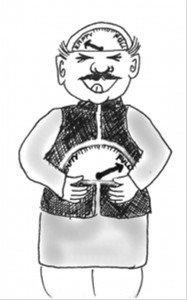
Road to nowhere
Sir,
It takes no rocket science to figure out how much petrol we consume and how much we need to store, provided those at the helm have the time to devote to these most basic tasks.
Defaults in payment by state institutions and business houses to PSO are a failure of governance. Our political leadership is responsible for this crisis, because it is he who selected these wizards and gave them responsibilities for which they either do not qualify, or they are not their priority, because they are too busy in other ventures. There are accepted international norms and ethics, such as Conflict of Interest rules, whose enforcement is essential for good governance. Regulatory control is one of the most vital constitutional functions of any government. Unfortunately regulation and public interest is bound to be a casualty if those appointed to regulate are traders for whom profit alone is the objective.
Public interest seems to be the lowest priority of every government that has been in power for the last thirty years. The net result of such callous abuse of power is visible in the collapse of state institutions. Energy shortage, collapse of public transport (air, rail or road), a dysfunctional health and education system, and failure to enforce the writ of law through strict deterrence, haunts 200 million citizens of Pakistan.
Greed for power and money is defiantly dominant among our policymakers. Terrorism, which threatens our national security today, is a self-inflicted cancer, just like all other ills in this country. Solution lies solely in the enforcement of law and constitution, deliverance of justice, accountability and appointments strictly on merit, with no tolerance for bribery and crime.
Bilal Asad,
Lahore.
No answers
Sir,
When this country was made, it was made in the name of peace, in the name of Islam, in the name of freedom. The colour designated to this land – green – signified peace. But we did not realize the gradual transition of this green into red. Why did we not see? Why did we let this happen? Why did we let this land be tainted with blood? Why is it that a Pakistani’s blood is so cheap? A bullet here, a blast there and we die. Not one person, not a hundred, but tens of thousands. And all the government does is announce a three day mourning.
But we do not learn any lessons, we just forget. Why don’t we do anything? Why don’t we play our part in saving this country. There are so many questions, but no answers. Every night, before I go to sleep, I ask myself what my entire day was about? Why was it all about myself? Why did I only pay attention to my own little problems? We tend to forget our goal in life is not only to focus on ourselves, not only to study, earn and live for ourselves. This country needs us, these people, these victims of terror need us.
So lets us make an effort. Let us save this land. Let us start organizations, let us donate, let us spend time in orphanages, let us teach kids who do not go to school. Let us colour this land green again.
Zainab Mansoor,
Lahore.
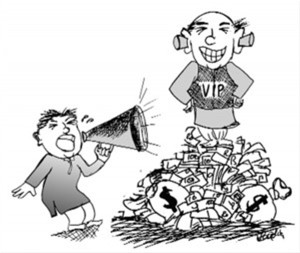
Business of politics
Sir,
The politics of Mohammad Ali Jinnah and Allama Muhammad Iqbal were driven by ideologies. Their motive was to serve the people. But after their demise, evacuee property was plundered through fake claims, and the bureaucracy declined to accept the change that in a sovereign independent country, state resources, land and assets should be dedicated for welfare of the most deprived, not to be doled out to buy loyalties of natives, as was the practice during the British Raj.
Then came Ayub Khan, imposing a martial law, burying Jinnah’s concept of a democratic welfare state with such schemes as bonus vouchers, enticing politicians without principles to build business empires in return for pledging loyalty to him. Those were the days when state funds started officially being plundered.
Individuals grew from rags to riches, tax evasion and corruption became institutionalized, and those entrusted with making policies betrayed their motherland, seeking foreign nationalities, while Pakistan became a transit place to make quick bucks and conveniently transfer them to foreign safe havens.
Corruption is accepted as a perk of power. When the US imposed an embargo on the sale of F16s to Pakistan, Islamabad had paid $500 million of the total $650 million, but we were told that balance due was $150 million plus $30 million for administrative expenditure – a name for commissions paid to those who matter and cannot be held accountable. Conveniently, there was no penalty in the one sided agreement for delays.
While Pakistan’s foreign reserves depleted and state owned enterprises like PIA, Railways, and Pakistan Steel Mills were driven to bankruptcy, individual and institutional corporate interests multiplied but debts mounted. The country’s security was in tatters, with terrorism threatening the state from within, and elite housing societies replacing green belts around every major city.
Arif Jamil,
Karachi.
Have faith
Sir,
The attribute of insecurity in an individual’s personality is a combination of lack of trust and confidence in his or her own being. This attribute is found in all age groups, ranging from childhood to adolescence and beyond. Many times, this sense of insecurity grows larger when a person ages as fears of losing the loved ones, possessions and other acquisitions creeps in. At other times, a person becomes more mature as he or she ages; and becomes capable of coping with insecurities effectively.
The feeling of insecurity exists at the domestic, personal and professional level. The feeling prevalent at the domestic and personal level involves instances of relationship management, which inculcates fears, thwarts confidence and trust regarding different relationships. It eventually spoils the relationship dynamics.
At the professional level, the feeling of insecurity prevails amongst the subordinates, fellow colleagues and peers. They fear the loss of their jobs, recognition and esteem in the workplace. Such feelings of insecurity are largely attributed to communication barriers, low level of self-efficacy in a person, and over indulgence in rivalries and competition. The feelings of insecurity distort one’s personality, and impede the effective utilization of one’s interpersonal skills.
Considering the adverse implications of insecurity residing in one’s personality, there stands a need to overcome this attribute. This can be well managed by holding a firm faith and by trying to raise self-confidence and self-trust. Not holding undue expectations from different relationships, and learning to manage relationships in a balanced way, aid in overcoming the sense of insecurity amongst individuals.
In addition, overcoming communication gaps amongst individuals, engaging in positive and healthy competition, and not imitating practices and values crazily are other positive initiatives for managing insecurity.
Aiyza Javaid,
Lahore.
Privatization
Sir,
There has been much debate about privatization in Pakistan over the years. Privatization in Pakistan was first conceived and implemented by then Prime Minister Nawaz Sharif in 1990. That program was envisaged to improve the growth of the national economy. But has this policy contributed towards a better future and a better economy?
In a research paper by Arif Hussain, which attempts to assess the impact of privatization on employment and output in Pakistan and consist of a data set including four years before and after the measures for operating efficiency. Profitability, output, capital investment and leverage are used as measures for efficiency. That study covered a total of 44 units privatized to determine their financial and operating efficiency. The sample includes various sectors like cement, oil and gas, banks and finance, chemical, and the auto industry. The study has shown no significant improvement in operating efficiency, profitability, output, capital investment and leverage. The results revealed in the study are surprisingly unexpected and quite a setback for advocates of privatization.
In another study on the financial and operating performance of privatized firms published in the International Journal of Finance and Economics shows quite contradictory results. The study substantiates that privatization has capitulated significant increase in performance which is empirically evident through overall performance of privatized sectors. However the way privatization has taken place over the years has raised some questions but in true sense it has worked well. In essence, the effective way of privatizing state owned enterprises is to spread it over a period of time. There should be a particular predefined order for privatization. The government should offer those units for sale which are already being a burden on the country, followed by less profitable units, and finally the more profitable ones. But due to some political circumstances, this practice has not been carried out in Pakistan.
To conclude, we can say that we may find privatization of state owned enterprises strenuous and demanding for employees in general, but the shift towards a high-performing economy and a high-skill manpower requires an optimal mix of state and private enterprises, which complement each other in achieving the desired results for the country.
Maaz Bin Abdul Quddus,
Islamabad.
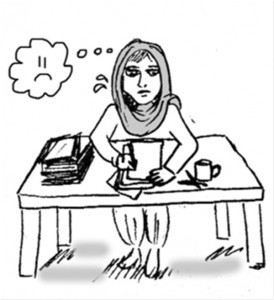
Go girls
Sir,
Women are often denied the right set of circumstances for education in our society. Despite any gains we have made, girls continue to suffer severe disadvantages in our education system, and these limitations lead to a decreased family income, put the girls at risk, leave little avenues for socialization, and hurt our society’s progress in the long run.
Women have to play three roles in our society, and everyone expects them to fulfill these responsibilities in the best manner possible. They have to be mothers, daughters, and wives. Even for these traditional roles, they need education.
But women’s access to education has been accepted as a fundamental right the world over. It is believed that women’s education brings economic progress to poor communities, and impacts the health and economic future of a community as well as a nation.
Educated women can make more effective decisions for their families, and the skills they develop help improve the quality of their lives. They are aware of their rights and cannot be easily exploited. And that is the kind of strong, independent women that our society needs.
Anna Abid,
Lahore.
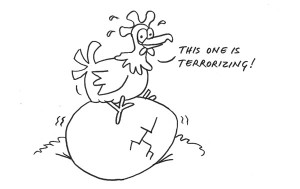
Reevaluation
Sir,
My compliments to PML-N MNA Rana Afzal who, allegedly, dramatically awoke from hibernation to ask the question that any sane person would ask: “Which eggs is Hafiz Saeed laying for us that we are nurturing him?”
All mobile networks were shut down and virtually all the police force and rangers of the country was needed to assist in keeping Muslims safe from other Muslims over the first days of the Islamic calendar. Then, Lal Masjid, another monument to the eggs the State so lovingly laid, “warned the government against the release of Aasia Bibi”. For inexplicable reasons, Pakistan is the only country in the world where people blaspheme with startling regularity despite an automatic death sentence, frequently applied extra-judicially. Interestingly, it is also the only national crime to which hundreds of fine, upstanding citizens become first hand witnesses all desperate to cast the first stone.
How many friends do we have remaining? Irrespective of who caused it, SAARC is quite dead. None of our other regional neighbours trust us. Practically no country in the world, including our ‘brotherly’ states, does either. Try getting a visa to anywhere. It may be difficult to stomach but China is our friend purely for the benefit of China. We must remain thrilled with ‘peanuts’, as Zia told our then American ‘friends’ not so very long ago. And as we tear each other apart, a critical question looms over us: how long will our “bum” protect us from ourselves?
The current CSS that determines the quality and pecking order of the future bureaucracy, and representative face, of the nation - 202 passing out of 9,643 sums up our dwindling intellectual capacity. This 2.09% is the lowest pass rate in a steadily declining trend of applicants over the past five years. The testosterone that occupies the residual brain space is so overpowering that we now seem to be incapable of recognizing ground realities. The state’s solution to that conundrum is simple: supress it; counter with disinformation; or just shoot the messenger! Convenient rule changes and a generally unscrupulous media ably assist. Except for an occasional spanner in the works. As now. And we know what’s happened there.
History has shown that a time comes when essential assets can become counter-productive. The inability or refusal to recognize that those liabilities can become millstones around one’s neck is a grave mistake. A country like Pakistan cannot afford to continue tilting, at evaporating windmills! Instead of shooting the messenger perhaps the time has come for some rational thinking on just where we stand in the comity of nations.
Dr Mervyn Hosein,
Karachi.

